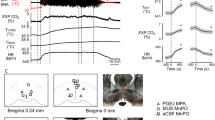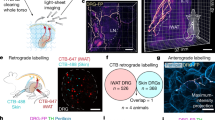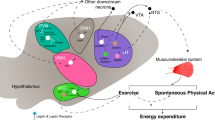Abstract
It is well established that electrical stimulation of the ventromedial hypothalamus (VMH) causes a reduction in food intake, whereas electrolytic or chemical lesions in this area result in hyperphagia and obesity in the rat. This has led to the suggestion that either the ventromedial nucleus itself, or nerve fibres passing close by, are important in the control of food intake. However, obesity due to VMH lesions occurs in weanling rats in the absence of hyperphagia and can develop in adult rats pair-fed with controls, indicating that destruction of this area also causes an increased metabolic efficiency (that is, a reduced energy expenditure). In normal rats, hyperphagia induced by feeding a highly palatable cafeteria diet is often accompanied by a large increase in heat production (diet-induced thermogenesis) which tends to prevent excessive weight gain and obesity1. This diet-induced thermogenesis is due to sympathetic activation of brown adipose tissue (BAT) and we have now investigated the possibility that the VMH is involved in the activation of this process. We found that electrical stimulation of this area produced increased BAT thermogenesis, which suggests that the VMH exerts a dual influence in the regulation of energy balance—an inhibitory effect on energy intake and a stimulatory effect on thermogenesis and energy output.
This is a preview of subscription content, access via your institution
Access options
Subscribe to this journal
Receive 51 print issues and online access
$199.00 per year
only $3.90 per issue
Buy this article
- Purchase on Springer Link
- Instant access to full article PDF
Prices may be subject to local taxes which are calculated during checkout
Similar content being viewed by others
References
Rothwell, N. J. & Stock, M. J. Nature 281, 31 (1979).
Flaim, K. E., Horwitz, B. A. & Horowitz, J. M. Am. J. Physiol. 232, R101 (1977).
De Groot, T. Trans. R. Neth. Acad. Sci. 52, 1 (1959).
Schonbaum, E., Johnson, G. E., Sellers, E. A. & Gill, M. J. Nature 210, 426 (1966).
Gold, R. M. Science 182, 488 (1973).
Kumon, A., Takahashi, A., Hara, T. & Shimazu, T. J. Lipid Res. 17, 551 (1976).
Shimazu, T. & Takahashi, A. Nature 284, 62 (1980).
McCormack, J. E. & Denton, R. M. Biochem. J. 166, 627 (1977).
Trayhurn, P. FEBS Lett. 104, 13 (1979).
Rothwell, N. J. & Stock, M. J. J. Physiol. Land. (in the press).
Rothwell, N. J., Stock, M. J. & Warwick, B. Proc. Nutr. Soc. (in the press).
Bernardis, L. L. & Goldman, J. K. J. Neurosci. Res. 2, 91 (1976).
Rothwell, N. J. & Stock, M. J. Can. J. Physiol. Pharmac. 58, 842 (1980).
Author information
Authors and Affiliations
Rights and permissions
About this article
Cite this article
Perkins, M., Rothwell, N., Stock, M. et al. Activation of brown adipose tissue thermogenesis by the ventromedial hypothalamus. Nature 289, 401–402 (1981). https://doi.org/10.1038/289401a0
Received:
Accepted:
Issue Date:
DOI: https://doi.org/10.1038/289401a0
This article is cited by
-
Hypothalamic control of energy expenditure and thermogenesis
Experimental & Molecular Medicine (2022)
-
Diurnal variations of brown fat thermogenesis and fat oxidation in humans
International Journal of Obesity (2021)
-
HYPOTHesizing about central comBAT against obesity
Journal of Physiology and Biochemistry (2020)
-
P110β in the ventromedial hypothalamus regulates glucose and energy metabolism
Experimental & Molecular Medicine (2019)
-
Leptin and brain–adipose crosstalks
Nature Reviews Neuroscience (2018)
Comments
By submitting a comment you agree to abide by our Terms and Community Guidelines. If you find something abusive or that does not comply with our terms or guidelines please flag it as inappropriate.



